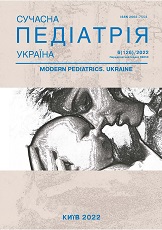Results of the analysis of epidemiological study of medical data on the effectiveness of Nasirus Sinus syrup in the complex therapy of acute viral and postviral rhinosinusitis in children
DOI:
https://doi.org/10.15574/SP.2022.126.110Keywords:
acute rhinosinusitis, children, herbal medicine, Nasirus Sinus syrupAbstract
In pediatric practice, the prevalence of rhinosinusitis (RS) depends on age: so, in the age category of 6-7 years old, acute RS at least 1 time per year old affects 8.5% of children, and at the age of 13-14 years old - 14.6%. Acute RS is one of the most common reasons for prescribing antibiotics, so correct treatment is extremely important, given the global crisis of antibiotic resistance. The tactics of treatment of acute RS depends on the form, nature of the inflammatory process and the presence of complications.
Purpose - to study the effectiveness of the plant-based dietary supplement Nasirus Sinus syrup in the complex therapy of children 3-11 years old with acute viral and postviral RS.
Materials and methods. Were analyzed medical data of 1176 children 3-11 years old who received outpatient therapy with a clinical diagnosis of “Acute viral RS” and “Acute postviral RS” (ICD-10: J01.9). The difference between these patients was only the duration of the disease.
Results. It has been established that the use of a plant-based dietary supplement Nasirus Sinus syrup in the complex therapy of children 3-11 years with acute RS helps to reduce subjective (nasal congestion, difficulty in nasal breathing, cough, snoring) and objective (mucous membrane hyperemia, postnasal drainage, rhinorrhea, wheezing, goopiness) manifestations of acute RS in a shorter time compared to the control group. The assessment of the severity of acute viral and postviral RS by Major Sinusitis Severity in absolute numbers in the main group was significantly different from the control group.
Conclusions. When using the complex therapy of acute viral and postviral RS in children 3-11 years with the inclusion of a plant-based dietary supplement Nasirus Sinus syrup, the results indicate a decrease in the manifestation of symptoms already on the 3rd day of therapy, reliably demonstrates positive dynamics on the 5th and 7th days. Nasirus Sinus syrup should be recommended for use in children in the complex therapy of RS.
The research was carried out in accordance with the principles of the Helsinki Declaration. The study protocol was approved by the Local Ethics Committee of all participating institutions. The informed consent of the patient was obtained for conducting the studies.
No conflict of interests was declared by the authors.
References
Ait-Khaled N et al. (2007). Prevalence of symptoms of asthma, rhinitis and dermatitis in 13-to-14-year-old children in Africa: The International Study of Asthma and Allergies in Childhood Phase III. Allergy. 62: 247-258. https://doi.org/10.1111/j.1398-9995.2007.01325.x; PMid:17298341
Benninger MS, Senior BA. (1997) The development of the rhinosinusitis disability index. Arch Otolaryngol Head Neck Surg. 123: 1175-1179. https://doi.org/10.1001/archotol.1997.01900110025004; PMid:9366696
Fokkens WJ. (2020). European Position Paper on Rhinosinusitis and Nasal Polyps 2020. Rhinology. 58 (29): 1-464. https://doi.org/10.4193/Rhin20.600; PMid:32077450
Jaume F, Valls-Mateus M, Mullol J. (2020). Common Cold and Acute Rhinosinusitis: Up-to-Date Management in 2020. Current Allergy and Asthma Reports. 20: 28. https://doi.org/10.1007/s11882-020-00917-5; PMid:32495003 PMCid:PMC7266914
Jund R, Mondigler M, Stammer H, Stierna P, Bachert C. (2015). Herbal drug BNO 1016 is safe and effective in the treatment of acute viral rhinosinusitis. Acta Otolaryngologica. 135: 42-50. https://doi.org/10.3109/00016489.2014.952047; PMid:25496178 PMCid:PMC4487568
Koch AK, Klose P, Lauche R, Cramer H, Baasch J, Dobos GJ, Langhorst J.Forsch A (2016). Systematic Review of Phytotherapy for Acute Rhinosinusitis. Komplementmed. 23 (3): 165-169. https://doi.org/10.1159/000447467; PMid:27404100
Laiko AA, Kosakovskyi AL, Zabolotna DD. (2013). Dytiacha atorynolarynholohiia. Natsionalnyi pidruchnyk. Kyiv: 576.
Leung AKC, Kellner JD. (2004, Mar-Apr). Acute sinusitis in children: diagnosis and management. J Pediatr Health Care. 18 (2): 72-76. https://doi.org/10.1016/j.pedhc.2003.08.007; PMid:15007290
Naumenko OM, Dieieva YuV, Dikhtiaruk OV, Marchenko YaV. (2020). Rezultaty analizu epidemichnoho doslidzhennia medychnykh danykh shchodo efektyvnosti preparatu Eazirus sinus u kompleksnii terapii hostroho virusnoho rynosynusytu u doroslykh. Zdorov'ia Ukrainy. 18 (487): 54-55.
Pawełczyk M, Kowalski ML. (2017). The role of human parainfluenza virus infections in the immunopathology of the respiratory tract .Curr Allergy Asthma Rep. 17 (03): 16. https://doi.org/10.1007/s11882-017-0685-2; PMid:28283855 PMCid:PMC7089069
Popovych VI. (2020). Hostryi ta khronichnyi rynosynusyt: porivniannia rekomendatsii EPOS 2012 r. ta 2020 r. Fokus na fitoterapiiu. Ukrainskyi medychnyi chasopys. 1; 2(136): 48-52.
Pukhlik SM. (2022). Rol fitoterapii u likuvanni hostroho rynosynusytu. Zdorov'ia Ukrainy. Tematychnyi nomer «Pediatriia». 3(64)-4(65).
Rider TH, Zook ChE, Boettcher TL et al. (2011). Broad-Spectrum Antiviral Therapeutics. PLOS ONE. URL: https://journals.plos.org/plosone/article?id=10.1371/journal.pone.0022572. https://doi.org/10.1371/journal.pone.0022572; PMid:21818340 PMCid:PMC3144912
Seliuk MN, Kozachok NN, Omeliashko MY, Seliuk OV. (2016). Ratsyonalnaia antybyotykoterapyia ostrыkh rynosynusytov v ambulatornoi praktyke. Simeina medytsyna: Naukovo-praktychnyi zhurnal. 3 (65): 115-119.
Shevchuk YuV, Bondarenko YaV. (2021). Mistse roslynnykh sekretolitykiv u kompleksnii terapii rynosynuitiv u ditei. Dytiachyi likar. 4: 26-33.
Tokarieva NM, Ahafonova OO, Petrenko LL. (2021). Fitoterapiia pry hostrykh rynosynusytakh u ditei. Zdorove rebenka. 16: 2. https://doi.org/10.22141/2224-0551.16.2.2021.229881
Downloads
Published
Issue
Section
License
Copyright (c) 2022 Modern pediatrics. Ukraine

This work is licensed under a Creative Commons Attribution-NonCommercial 4.0 International License.
The policy of the Journal “MODERN PEDIATRICS. UKRAINE” is compatible with the vast majority of funders' of open access and self-archiving policies. The journal provides immediate open access route being convinced that everyone – not only scientists - can benefit from research results, and publishes articles exclusively under open access distribution, with a Creative Commons Attribution-Noncommercial 4.0 international license (СС BY-NC).
Authors transfer the copyright to the Journal “MODERN PEDIATRICS. UKRAINE” when the manuscript is accepted for publication. Authors declare that this manuscript has not been published nor is under simultaneous consideration for publication elsewhere. After publication, the articles become freely available on-line to the public.
Readers have the right to use, distribute, and reproduce articles in any medium, provided the articles and the journal are properly cited.
The use of published materials for commercial purposes is strongly prohibited.

